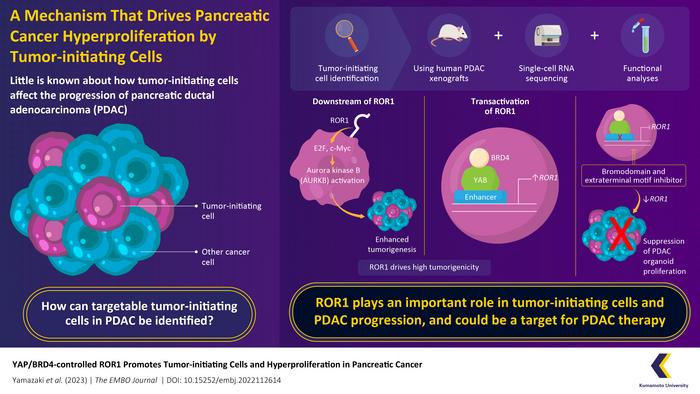Tumor-initiating cells, or cancer stem cells, are gaining attention in cancer therapy, as they can travel through the body and cause cancerous tumors at other sites through metastasis. These cells also may cause resistance to chemotherapy. Pancreatic ductal adenocarcinoma (PDAC) is a type of cancer that has a poor prognosis. The problem of metastasis is particularly prominent in this type of cancer. Though the tumor-initiating cells are implicated in the disease progression of some cancers, their specific role, unique traits, and the underlying signaling pathways of their action in pancreatic adenocarcinoma remain poorly understood. It also remains unknown whether eradicating these cells in PDAC can bring about any therapeutic benefit. Previous research has shown that epithelial–mesenchymal transition (EMT)-like cells dispersed in tumors have metastatic and tumorigenic capacities, making such EMT populations good candidates for tumor initiation in PDAC. Receptor tyrosine kinases (RTKs) are a class of cell surface markers whose aberrant activation causes cancer progression. In particular, ROR1 is an RTK known to be involved in multiple human cancers.

Credit: Masaya Yamazaki from Kumamoto University, Japan
Tumor-initiating cells, or cancer stem cells, are gaining attention in cancer therapy, as they can travel through the body and cause cancerous tumors at other sites through metastasis. These cells also may cause resistance to chemotherapy. Pancreatic ductal adenocarcinoma (PDAC) is a type of cancer that has a poor prognosis. The problem of metastasis is particularly prominent in this type of cancer. Though the tumor-initiating cells are implicated in the disease progression of some cancers, their specific role, unique traits, and the underlying signaling pathways of their action in pancreatic adenocarcinoma remain poorly understood. It also remains unknown whether eradicating these cells in PDAC can bring about any therapeutic benefit. Previous research has shown that epithelial–mesenchymal transition (EMT)-like cells dispersed in tumors have metastatic and tumorigenic capacities, making such EMT populations good candidates for tumor initiation in PDAC. Receptor tyrosine kinases (RTKs) are a class of cell surface markers whose aberrant activation causes cancer progression. In particular, ROR1 is an RTK known to be involved in multiple human cancers.
Now, researchers in Japan have confirmed that a subpopulation of partial EMT-like cells expressing ROR1 can promote hyperproliferation in pancreatic cancer and cause metastasis. The group’s findings have recently been published in The EMBO Journal on 25 April 2023. Dr. Masaya Yamazaki, who worked on this study with a team of researchers guided by Professor Kazuya Yamagata at Kumamoto University, explains, “We wanted to identify the mechanism through which tumor-initiating cells act as cancer buds, leading to the design of new anti-cancer drugs. So, we first investigated cellular diversity within PDAC at the single-cell level.”
The group sought to identify tumor-initiating cells by combining several techniques, ranging from single-cell RNA sequencing to the use of human PDAC xenografts–wherein human cancerous tissue is transplanted into mice. The group found that when transplanted into mice, pancreatic cells with a high level of ROR1 were more efficient at producing cancerous tissue than those with low ROR1 levels. They also found that ROR1high cells are abundant in metastatic lesions, suggesting that these ROR1high cells were the origin of metastases. Additionally, ROR1high cells contributed to cancer relapse after chemotherapy. Interestingly, inhibiting ROR1 expression during chemotherapy caused a reduction in the recurrence. “ROR1 is a characteristic marker of partial EMT-like cells localized in pancreatic tumor tissue, and high expression of ROR1 drives tumorigenicity, intratumor heterogeneity, and tumor progression,” says Dr. Yamazaki as he elaborates on the study’s highlights.
The researchers further elaborated on the role of ROR1 at the molecular level, confirming that ROR1 induces the expression of the protein Aurora kinase B, which is known to accelerate tumor proliferation. The group also discovered Yes-associated protein (YAP) / bromodomain containing 4 (BRD4)-axis as factors involved in the regulation of ROR1 gene expression. Based on the results of these studies, the group proposed the use of BET inhibitors as a therapeutic approach to target ROR1.
The group is confident that their findings have laid the foundation for improved pancreatic cancer therapy strategies and future drug discovery. “These results suggest the importance of studying ROR1 so we can understand its role in the pathogenesis of PDAC and other cancers.” concludes Dr. Yamazaki.
About Masaya Yamazaki
Dr. Masaya Yamazaki is an Academic Researcher working under the guidance of Dr. Kazuya Yamagata in the Department of Medical Biochemistry at Kumamoto University. He earned his Doctor of Medicine degree in 2022 from Kumamoto University. His research areas include tumor biology, cancer metastasis, and gastroenterology. He has published eight peer-reviewed articles and delivered 20 lectures and oral presentations since 2019.
Journal
The EMBO Journal
DOI
10.15252/embj.2022112614
Method of Research
Experimental study
Subject of Research
Cells
Article Title
YAP/BRD4-controlled ROR1 promotes tumor-initiating cells and hyperproliferation in pancreatic cancer
Article Publication Date
25-Apr-2023
COI Statement
The authors declare that they have no conflict of interest.


